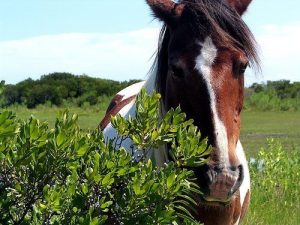Medical Verses Behavioral Issues
Medical problems verses behavioral issues appear or are differentiated by the progression and symptoms of the problem in a horse. For example, self-mutilation may be due to a medical problem such as colic or a digestive disorder. However, most self-mutilation involves biting of the limbs, flanks or  chest area. It can appear in a sexually frustrated horse, usually male, or in socially incompatible horses. The underlying problem needs to be addressed and corrected by pasturing with a female, increasing roughage while decreasing grain and exercise.
chest area. It can appear in a sexually frustrated horse, usually male, or in socially incompatible horses. The underlying problem needs to be addressed and corrected by pasturing with a female, increasing roughage while decreasing grain and exercise.
Mares Rejecting Foal
Protecting foals can be quite a challenge when it comes to the mares rejecting their foal. There are 3 situations that can occur:
• Mares that will accept the foal, but will not let it suckle
• Mares that show stallion-like behavior and attempt to kick or bite the foal
• Mares that are afraid of their foal and simply run away from it
It is normal to see a mare paw at their foal in attempts to stimulate them to get up from lying down, which is a lot different from rejection. Mares can kill their foals if they are underweight or not getting enough to eat, though it is quite uncommon. It is important to protect the foal by helping the mare through several nursing sessions until she learns that suckling is enjoyable. Use cross ties or partial barriers so that she does not injure the foal. The mare should still be able to see and smell the foal but not able to reach for it.
Make sure there is nothing wrong with her udder, no infection, mastitis or sores that could be causing her pain. Obviously, this would cause her to not want to nurse her foal. Milking the mare, light massaging with a hose or using warm water baths and soaks can help relieve the pressure from infrequent nursing. Mares that are afraid of their foals do better in quieter or darker stalls. Sometimes dogs have been used to stimulate maternal ‘herding’ so the mare will protect the foal. Unfortunately, if a mare attempts to injure their foal, they must be restrained using bars or stocks while at the same time, they can ben counter-conditioned using positive rewards. Sometimes a replacement ‘nursing’ mare must be brought in or hand nursing must be done with the foal they receive the right nourishment.
Breeding
Another cause of poor libido is a poor breeding environment. It is quite common for stallions to be ‘picky’ about their environment. Distractions from unexpected, rapid movements, constant yelling or rough handling can cause a stallion to lose interest. Pasturing with a mare or providing them with a variety of mares can peak their interest.
Aggressive behaviors can also be seen in stallions if they are overused or used out of season. Stallions may develop preferences for mating and may not always be compatible with the chosen mare. Offering another mare may help the situation. Sometimes if stallions are stabled with mares when they were colts, they can develop some social inhibitions when it comes to mating. Forcing them to mate can cause aggressive behaviors so the underlying problem must be identified.
Photo: Courtesy of Casey Geib via Flickr (CC By 2.0)









